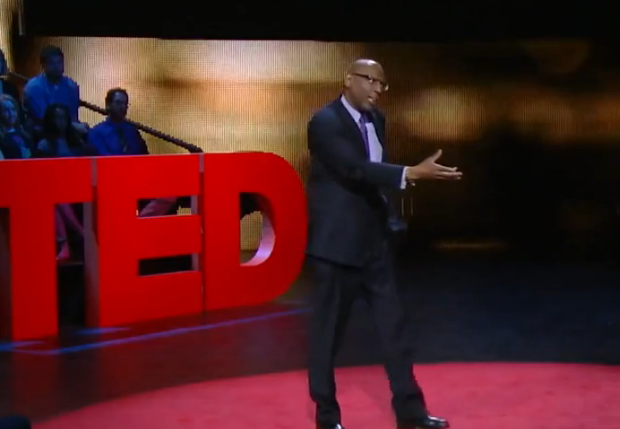Here's what we know. We know that the problem begins immediately. Right?
以下是我們所知道的東西。我們知道,問(wèn)題很快就會(huì)來(lái)的。對(duì)吧?
This idea, zero to three.
我們來(lái)談?wù)剫雰簭某錾饺龤q的變化情況。
My wife, Yvonne, and I, we have four kids, three grown ones and a 15-year-old. That's a longer story.
我的妻子Yvonne和我一共育有四個(gè)子女,其中三個(gè)已經(jīng)成年,還有一個(gè)已經(jīng)15歲了。說(shuō)來(lái)話長(zhǎng),呵呵。
With our first kids, we did not know the science about brain development.
第一個(gè)孩子出生時(shí),我們不了解小孩子大腦發(fā)育方面的科學(xué)知識(shí)。
We didn't know how critical those first three years were.
我們也不知道這頭三年是如此的重要。
We didn't know what was happening in those young brains.
我們不清楚這三年這些孩子大腦中發(fā)生了什么。
We didn't know the role that language, a stimulus and response, call and response,
我們不知道語(yǔ)言、刺激和反應(yīng)、呼喚和回應(yīng)這些因素
how important that was in developing those children.
在小孩成長(zhǎng)中有多重要。
We know that now. What are we doing about it? Nothing.
而這些東西我們現(xiàn)在全部研究清楚了。可我們有為此做過(guò)什么事嗎?也沒(méi)有。

Wealthy people know. Educated people know. And their kids have an advantage.
可富人們知道,受過(guò)良好教育的人們也知道。而且他們自己的孩子也擁有某些優(yōu)勢(shì)。
Poor people don't know, and we're not doing anything to help them at all. But we know this is critical.
可窮人們不知道,而我們又沒(méi)有做任何事來(lái)幫助他們。但我們知道這很重要。
Now, you take pre-kindergarten. We know it's important for kids.
現(xiàn)在我們有學(xué)前班。我們知道學(xué)前班對(duì)小孩子很重要。
Poor kids need that experience. Nope. Lots of places, it doesn't exist.
窮人家的孩子也需要這一體驗(yàn)。可是沒(méi)有。很多窮地方根本沒(méi)有學(xué)前班。
We know health services matter.
我們知道健康服務(wù)很重要。
You know, we provide health services and people are always fussing at me about, you know,
你知道的,我們提供健康服務(wù),人們總認(rèn)為我是大驚小怪的人,
because I'm all into accountability and data and all of that good stuff,
因?yàn)槲蚁矚g問(wèn)責(zé)和數(shù)據(jù)和所有好東西,
but we do health services, and I have to raise a lot of money.
但我們有健康服務(wù),我必須籌措大量的資金。
People used to say when they'd come fund us, "Geoff, why do you provide these health services?"
過(guò)去,常有人說(shuō)他們會(huì)資助我們,“Geoff,你為什么不提供這些健康服務(wù)呢?”
I used to make stuff up. Right?
我過(guò)去常常編造一些鬼話搪塞他們。
I'd say, "Well, you know a child who has cavities is not going to, uh, be able to study as well."
我常說(shuō):“一個(gè)小孩子如果有太多的蛀牙,他就不能管好自己的學(xué)習(xí)。”
And I had to because I had to raise the money.
我要籌措資金就必須編這些鬼話來(lái)搪塞他們。
But now I'm older, and you know what I tell them?
但現(xiàn)在我老了,你知道我是怎么和他們說(shuō)的嗎?
You know why I provide kids with those health benefits and the sports and the recreation and the arts?
你知道我為什么為這些小孩提供這些健康服務(wù)、運(yùn)動(dòng)、娛樂(lè)和藝術(shù)嗎?
Because I actually like kids. I actually like kids.
這是因?yàn)槲蚁矚g小孩子。我是真的喜歡他們。



